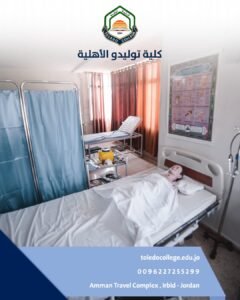Qualifi Level 5 Extended Diploma in Health and Social Care
The qualification is made up of 11 units. All units are mandatory and learners need to achieve all the mandatory units to be awarded the QUALIFI Level 5 Extended Diploma in Health and Social Care. Learners who achieve 120 credits at Level 4 may be awarded an exit qualification. This will be the QUALIFI Level 4 Diploma in Health and Social Care (501/5058/0)
The Level 5 units are designed to dovetail into a top-up undergraduate year at a UK University.
Course Title
Qualifi Level 5 Extended Diploma in Health and Social Care
Course Level
Course Credits
Study Method
Start Date
Course Duration
Awarded By
Qualifi
Toledo College- Irbid- Jordan
Course Description

The Qualification has been created to develop and reward the business health and social care workers of today and the future, and to continue to bring recognition and professionalism to the health and social care sector. The rationale of the programmes is to provide a career path for learners who wish to develop their management and care capabilities within the health and social care sector.
Course Content
Academic Study Skills
The aim of this unit is to enable learners to develop the necessary skills and understanding to study effectively within higher education. This will enable learners to acquire the necessary reflective and critical thinking skills required to achieve individual learning potential.
Communication for Health and Social Care
The aim of this unit is to develop the learner’s awareness of different forms of communication used in health and social care settings and the importance of communication for effective service delivery.
Please note that for learners working in or studying the qualification in the UK, their evidence in relation to legislation, regulations, codes of practice etc must be in a UK context. If learners are not in the UK, they must state the country they are referring to in relation to these areas.
An Introduction to Healthcare Policy
The aim of this unit is to develop learner awareness of different influences on healthcare and their effect on the development of policy. Evaluation of healthcare policy will allow learners to examine what the key contemporary issues for those making policy, providers and those receiving support.
Please note that for learners working in or studying the qualification in the UK, their evidence in relation to legislation, regulations, codes of practice etc must be in a UK context. If learners are not in the UK, they must state the country they are referring to in relation to these areas.
Reflective Practice
This unit is designed to introduce the learner to reflective practice in all its forms. Reflections on practice and in practice are important concepts in health and social care and feed into the idea of self -development linking theory to practice.
Please note that for learners working in or studying the qualification in the UK, their evidence in relation to legislation, regulations, codes of practice etc must be in a UK context. If learners are not in the UK, they must state the country they are referring to in relation to these areas.
Managing People in Health and Social Care
The aim of this unit is to enable learners to understand the processes involved in the recruitment, management and development of people in the health and social care workplace. In this unit learners will investigate the processes involved in the management of individuals in the health and social care workplace and how to facilitate change in the organisation.
Please note that for learners working in or studying the qualification in the UK, their evidence in relation to legislation, regulations, codes of practice etc must be in a UK context. If learners are not in the UK, they must state the country they are referring to in relation to these areas.
Sociology Concepts in Health and Ill Health
The aim of this unit is for learners to gain an understanding of sociological concepts of health and ill health and their application to care practice in health and social care. It will enable learners to gain an understanding of the nature of contemporary society and its influences on the perception of health and ill health.
Learners will explore how society is structured in terms of age, gender, ethnicity, social class, family and households and its impact on health and wellbeing.
Please note that for learners working in or studying the qualification in the UK, their evidence in relation to legislation, regulations, codes of practice etc must be in a UK context. If learners are not in the UK, they must state the country they are referring to in relation to these areas.
Principles Underpinning Health and Social Care
All health and social care professionals have professional codes of conduct. The aim of this unit is to develop learner understanding of the values, theories and policies underpinning health and social care practice and the mechanisms that exist to promote good practice within the sector.
Please note that for learners working in or studying the qualification in the UK, their evidence in relation to legislation, regulations, codes of practice etc must be in a UK context. If learners are not in the UK, they must state the country they are referring to in relation to these areas.
The Management of Quality in Health and Social Care
Quality is an essential component of health and social care services and a concept with many different interpretations and perspectives. The aim of this unit is for learners to develop an understanding of different perspectives on health and social care service quality and how it is evaluated in order to empower and involve users of services.
Please note that for learners working in or studying the qualification in the UK, their evidence in relation to legislation, regulations, codes of practice etc must be in a UK context. If learners are not in the UK, they must state the country they are referring to in relation to these areas.
Research Project
This unit aims to develop the learner’s skills of independent enquiry and critical analysis by undertaking a small pilot investigation of direct relevance to their higher education programme or professional development.
Please note that for learners working in or studying the qualification in the UK, their evidence in relation to legislation, regulations, codes of practice etc must be in a UK context. If learners are not in the UK, they must state the country they are referring to in relation to these areas.
Partnership working in Health and Social Care
The aim of this unit is to enable learners to develop an understanding of the importance of working positively in partnership with others in health and social care. Learners will explore the nature of partnership on three levels. First, they will examine partnerships with users of services that empower individuals to make informed decisions and encourage independence.
Second, they will consider partnerships between different professionals within health and social care and explore inter-agency working. Finally, learners will investigate organisational partnerships and examine different ways of working together.
Please note that for learners working in or studying the qualification in the UK, their evidence in relation to legislation, regulations, codes of practice etc must be in a UK context. If learners are not in the UK, they must state the country they are referring to in relation to these areas.
Working with Service users with Complex Needs
The aim of this unit is to help learners to understand issues of health, disability and illness and how healthcare professionals can empower those with complex physical and mental health needs to determine their own care.
Please note that for learners working in or studying the qualification in the UK, their evidence in relation to legislation, regulations, codes of practice etc must be in a UK context. If learners are not in the UK, they must state the country they are referring to in relation to these areas.
Study Method
The Qualifi Level 5 Extended Diploma in Health and Social Care is studied through Education Global Network’s leading college (Toledo College) in-class learning. You will be provided instant access to study materials, dedicated one-on-one tutoring and assignment feedback through qualified tutors.
Our online learning platform is designed to provide students with a flexible and convenient way to access high-quality education. With a vast library of study materials and resources available 24/7, students can learn at their own pace and on their own schedule.
Our experienced and knowledgeable tutors are available to answer questions, provide feedback, and offer guidance to help students succeed.
Course Fees
Please get in touch with us to get the most up-to-date course fee for Qualifi Level 5 Extended Diploma in Health and Social Care. Monthly Installment is available.

Entry Requirements
The qualification has been designed to be accessible without artificial barriers that restrict access, for this qualification applicants must be aged 18 or over. It is envisaged that learners entering the Level 4 Diploma will have a Level 3 qualification. Learners entering the Level 5 Diploma will have a Level 4 qualification. Please make an enquiry Now.
Apply now to embark on your academic journey and unlock endless opportunities! Join our vibrant community of scholars and leaders, and pursue your passion with an internationally recognised British qualification.
Click Apply Now to start your application for the Qualifi Level 5 Extended Diploma in Health and Social Care programme today.
Toledo College – Irbid – Jordan
